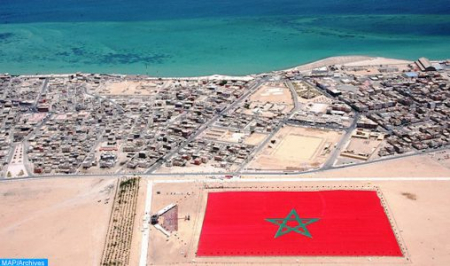Dakhla: International Meeting Highlights Relevance of Autonomy Plan in Moroccan Sahara
Several civil society actors and African diplomats have stressed, Saturday in Dakhla, the relevance of the autonomy plan presented by Morocco to end the artificial conflict over the Moroccan Sahara. During an international meeting on Morocco’s autonomy plan, which is part of the festivities marking the celebration of the 19th anniversary of HRH Crown Prince Moulay El Hassan, speakers highlighted the international momentum in favor of Morocco’s sovereignty over its Sahara and the diplomatic achievements made by the Kingdom under the enlightened leadership of HM King Mohammed VI. Initiated by the Sahrawi Association of Solidarity for the Autonomy and Sustainable Development Project in France, in partnership with the network of civil society in Dakhla-Oued Eddahab, participants stressed that Morocco confidently continues the path of development of southern provinces that have experienced strong growth in terms of development projects and various investment opportunities in several productive sectors. Speaking on this occasion, the former minister of Senegalese Abroad, Ngone Ndoye, reaffirmed Senegal’s long-standing support for the Moroccan Sahara and the autonomy plan, as a realistic solution to this artificial regional dispute. Ndoye, who is also a senator and chair of the Committee on Population, Health and Social Action at the ACP-EU Joint Parliamentary Assembly, underlined the “unwavering” stance of Senegal on this issue, given the strong and solid relations binding the two countries, which led to the opening of the Consulate General of her country in Dakhla. She said that the autonomy plan is based on building a modern democratic society, based on the rule of law, individual and collective freedoms and economic and social development, within the framework of respect for the sovereignty of the Kingdom. In this regard, she recalled the resolutions of the Security Council that enshrine the preeminence of the autonomy plan as a credible, serious, realistic solution to settle this regional dispute. For her part, the former Secretary General of the Ministry of Security of the Republic of Burkina Faso, Maimouna Thiombiano, said that her country supports the Moroccanness of the Sahara, noting that Morocco has a comprehensive strategy to consolidate and diversify its actions in the African continent, including the Economic Community of West African States (ECOWAS). Referring to the security component, Thiombiano stressed that her country is fighting against terrorism since 2015, noting that the fight against this phenomenon requires the assistance of all African countries, including Morocco. Moreover, she underlined that African women must unite and move forward to ensure the unity of Africa and its development. For her part, the president of the Sahrawi Association of Solidarity and Awareness-raising on the Autonomy and Sustainable Development Project in France, Zahra Hidara, welcomed the successive victories of Moroccan diplomacy in favor of the national cause and the opening of numerous consulates in the southern provinces of the Kingdom, thanks to the enlightened vision of HM King Mohammed VI. Hidara hailed, in this regard, the Spanish position highlighting the relevance and credibility of the autonomy plan to settle the artificial conflict over the Moroccan Sahara. In addition, she called for an end of the ordeal and suffering endured by the populations held against their will in the Tindouf camps, and for allowing them to return with dignity to their homeland, Morocco. In her turn, Her Excellency Sheikha Noora Bint Khalifa Al Khalifa of the Kingdom of Bahrain welcomed, in a statement to MAP, the opening of the Consulate General of her country in Laayoune, an initiative that reflects the strength of relations between the two countries. She also highlighted the huge investment opportunities in the Moroccan Sahara, calling for sustainable business cooperation with women entrepreneurs from the southern provinces. This international meeting was marked by an exhibition of handicrafts and a visit to the border post of El Guerguarat, in addition to the screening of the latest film by director Rabii El Jawhari, “Siga”, which addresses the issue of the territorial integrity of Morocco and the unwavering commitment of the Moroccan people to national unity.

